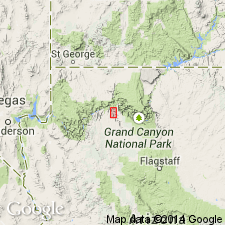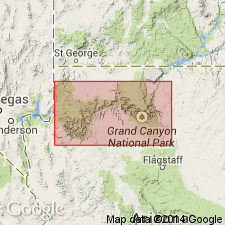
- Usage in publication:
-
- Wescogame Formation*
- Modifications:
-
- Named
- Dominant lithology:
-
- Sandstone
- Mudstone
- AAPG geologic province:
-
- Plateau sedimentary province
Summary:
Named as one of four formations of Supai Group (rank raised) for Wescogame Point, west side Havasu Canyon about 3 mi southwest of Supai village above Hualapai Canyon, Coconino Co, AZ, Plateau sedimentary province. Type section measured at Wescogame Point. Is 199.5 ft thick at type where it unconformably overlies Manakacha Formation (new) of Supai and unconformably underlies Esplanade Sandstone (rank raised) of Supai. Both contacts are at channeled surfaces. Composed dominantly of massive cross-bedded sandstone or sandy limestone. Includes a cliff (lower part) and slope (upper part). Sandstone is pink gray to moderate red orange, very fine to fine grained, calcareous, flat bedded. Mudstone is light brown, noncalcareous, thin bedded, flat bedded, and fossiliferous (fusulinids). Nomenclature table. Of Virgilian, Late Pennsylvanian age.
Source: GNU records (USGS DDS-6; Denver GNULEX).

- Usage in publication:
-
- Wescogame Formation*
- Modifications:
-
- Revised
- AAPG geologic province:
-
- Plateau sedimentary province
Summary:
Rocks formerly included in the Calleville Limestone in the extreme western part of the Grand Canyon are now included in the lower part of the Supai Group (Wescogame Formation). Age is Late Pennsylvanian.
Source: GNU records (USGS DDS-6; Menlo GNULEX).
For more information, please contact Nancy Stamm, Geologic Names Committee Secretary.
Asterisk (*) indicates published by U.S. Geological Survey authors.
"No current usage" (†) implies that a name has been abandoned or has fallen into disuse. Former usage and, if known, replacement name given in parentheses ( ).
Slash (/) indicates name conflicts with nomenclatural guidelines (CSN, 1933; ACSN, 1961, 1970; NACSN, 1983, 2005, 2021). May be explained within brackets ([ ]).

